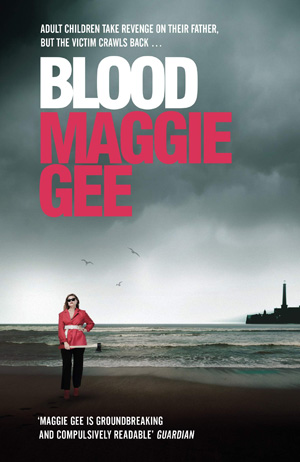
Written by Maggie Gee — Far from the ordinary crime story, literary author Maggie Gee’s Blood is a comic excursion into the rough-and-tumble mind of narrator Monica Ludd. She’s 38, over six feet tall, outspoken and awkward, far from tiny with, as she is fond of pointing out, an enormous bosom. When Monica squeezes you into the rollercoaster seat beside her on page one, you’re in for a wild ride.
Monica is a respectable citizen of East Kent, she claims. Much of the story plays out on the coast and on the peninsula of Thanet. The little community, the seashore and shops come to life nicely. Even such a remote area has its dose of violence, terrorism and, well, blood.
Monica has a job. She’s the deputy head in a school, loathes her new boss, and takes no pains to hide it. She thinks he’d like to be rid of her – and who could blame him? – but rarely stands up to her. He did have to ask her to stay off social media after complaints: “Governors queried your use of ‘moron’ and ‘twat.'”
In fact, much of what apparently goes on in her classroom is something governors and parents too would complain about, if they knew.
Monica has five brothers and sisters, all grown up now and all awful, according to her anyway. Her youngest brother Fred died in Afghanistan, while her younger sister Fairy is a pale, skinny model. Twins Angus and Boris got rich in IT and elder sister Anthea is fashion-forward and possibly a lesbian. Ma is in a care home, forgetting everything or choosing not to remember, it’s hard to say which.
But it’s Dad who drives the family disaster train. The violence he’s perpetrated has affected them all. He’s a dentist who has sex with his patients in the chair. He’s a serial philanderer whose current girlfriend is two decades younger than Monica. When his children were young, he beat them. He mocks them yet. His bullying drove Fred into the army and the siblings blame him for Fred’s death.
The final insult – and the inciting incident of the novel – occurs when the siblings organise an elaborate party in Fred’s memory, and Dad doesn’t show up. Monica is so angry she says she’s going to kill him. Alas, a lot of people hear this threat and the next morning when Monica finds Dad’s brutally beaten, blood-soaked body, even her siblings think she’s a murderer. That attack launches her impulsive and lengthy campaign of lies and misdirection. Ultimately, she tries to disappear. While you may believe Monica could not possibly deal with her predicament in any worse ways, Gee has a number of surprises in store that help fulfil Monica’s prediction that you will find her more sinned against than sinning.
Monica is like a bull in a china shop when dealing with the police and members of her own family, making one bad decision after another. Perhaps worst of all is her go-for-broke strategy in dealing with the red-haired detective she calls Ginger – she tries to seduce him. Family relations are more complex, of course, and her interactions with each of her siblings reveal the sometimes illogical jumble of emotions brothers and sisters evoke in each other. There’s truth in the old saying, blood is thicker than water, and you see it here. Their loyalty to her through this whole saga says volumes about the sides of Monica that she tries to hide with her bluster.
In Monica, Gee has created an unforgettable character. Not only large, but larger than life. Profane and resourceful. She speaks her mind, loudly. Opinions she thinks are in her head are actually uttered, to her hearers’ consternation. And she is a genius at self-justification. All of which turns out to be highly entertaining, even when you’re feeling embarrassed on her behalf. In other words, she makes a fascinating literary companion, though you’ll probably feel glad you don’t actually know her.
From a crime fiction point of view, Blood is unconventional – refreshingly so, in my view – and a reminder that violence and retribution, jealousy and fear have been important literary themes forever. Literary novelist Maggie Gee, OBE, is a fellow of the Royal Society of Literature and was its first female chair.
For interesting female protagonists, try Dreda Say Mitchell’s Spare Room or Denise Mina’s Conviction.
Fentum Press
Print
£6.97
CFL Rating: 5 Stars